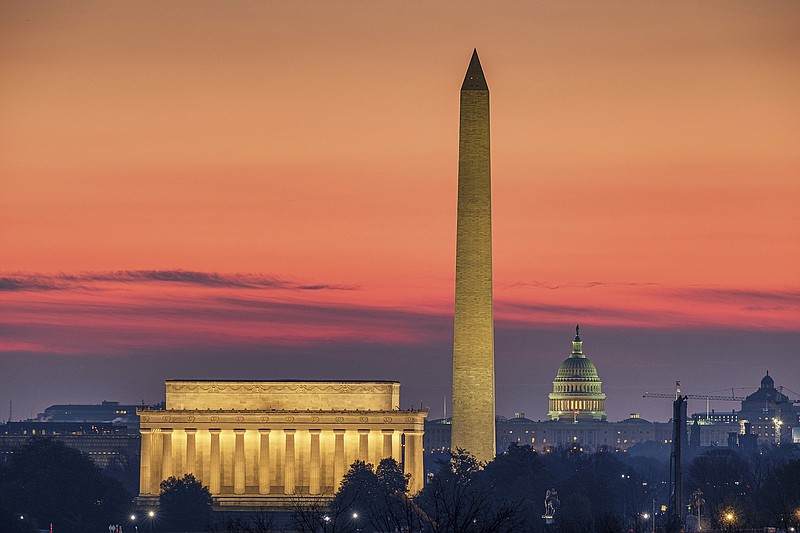The cancel culture is alive and well and can't wait to start slashing names in Washington, D.C., but it apparently won't get the opportunity anytime soon to take wrecking balls to the Washington Monument and Jefferson Memorial.
Not yet, anyway.
A task force commissioned by the Washington, D.C., government recommended on Tuesday the renaming of scores of schools, parks and buildings in the nation's capital and suggested that Mayor Muriel Bowser use her "position on the National Capital Memorial Advisory Commission" to "recommend the Federal government remove, relocate, or contextualize" assets that included the Washington Monument and the Jefferson Memorial.
After the idea drew backlash from the White House and members of Congress and was mocked by social media, the mayor on Wednesday emphasized she wanted the group to focus on "local D.C." and not federally owned monuments.
Besides, some officials affiliated with the task force said, it was unlikely the federal monuments would be removed but more likely they would be contextualized.
Of course, that's what many people thought should happen to monuments of Confederate Civil War generals. We've held that position for years - not to tear down the statues but to give people context of who they represented and relate that they fought for a cause that denied freedom to millions of people.
But following the death of Black suspect George Floyd at the hands of Minneapolis police in May, protesters and anarchists - with law enforcement in some places doing nothing to stop them - hauled down statues across the nation. But they didn't stop at Confederates. They went after explorer Christopher Columbus, abolitionists and people who had nothing to do with slavery or the Civil War.
The Washington task force, known as District of Columbia Facilities and Commemorative Expressions (DCFACES), was assembled in July and quickly threw together plans to rename 153 places. Its 24-page executive summary said members focused on "key disqualifying histories, including participation in slavery, systemic racism, mistreatment of, or actions that suppressed equality for, persons of color, women and LGBTQ communities and violation of the DC Human Rights Act."
The summary, the front cover of which displays a "Black Lives Matter" mural along a mall leading to the White House in the background, boasts of public input. But, taken together, the 275 people who attended a town hall meeting and the roughly 2,300 people who filled out web surveys on the issue represent about .37% of the city's population.
Nevertheless, the group persisted.
Schools named for Presidents Thomas Jefferson, James Monroe, John Tyler, Zachary Taylor and Woodrow Wilson, along with 16 others including ones named for telephone inventor Alexander Graham Bell and "The Star Spangled Banner" author Francis Scott Key, were marked for changes.
READ MORE: Across South, a push to change Confederate school names
Job core centers named for Presidents Jefferson, Tyler and Wilson, plus six residential buildings/campuses, were set to be altered. Parks, fields and playgrounds honoring Presidents Jefferson, Monroe and William Henry Harrison would have their names excised. D.C. government buildings that include the names of President Andrew Jackson, Founding Father Benjamin Franklin and Key would be changed.
Most people, including in Washington, D.C., would be hard-pressed to identify most of the other names on the "cancel" list without a thorough internet search, but if somebody, somewhere, for some reason, objected, apparently they made the list.
Matthew Gault Emery, for instance, was a Union captain who led the local militia in D.C. during the Civil War and later was Washington, D.C.'s last mayor during a period of home rule. Guy Mason, who lived mostly in the 20th century, was a Franklin Roosevelt-appointed member of the three-man commission that at the time governed D.C. and, in his position, supervised various agencies under the Board of Public Welfare and the Health Department.
Others owned slaves, one ordered the execution of a Native American chief, another was on the city's board of education when it was sued over desegregation and one appears to have offended a task force member because he was an arms manufacturer.
Did any of the individuals whose names are to be canceled do any good at all, perhaps enough to get their name on a building, park or school? At this point, we don't know because the group hasn't released its full report.
We wonder, too, when they decide on replacement names, how they'll find individuals with no flaws. No Roosevelt, Kennedy, Johnson, Clinton, Obama or even M.L. King names, for instance, fit that bill.
We don't have a problem with any city - in this case one whose residents are largely Black - updating the names of some of their assets, especially if it's appropriate for the population that uses them.
But that's the problem with the cancel culture. It doesn't want to rename something because it's appropriate. It wants to rename 153 somethings because a group could dig up something from the long past and present it as a current grievance. In the end, none of that provides racial healing or moves the country forward in any way.
